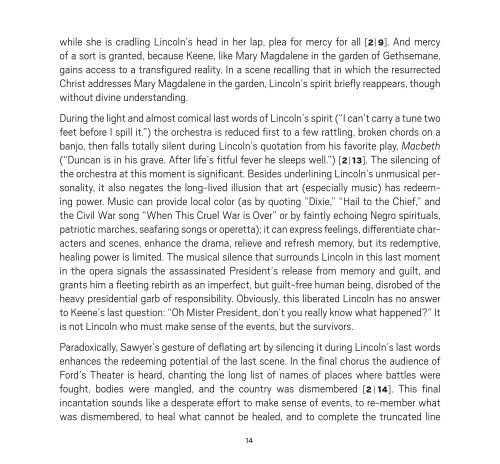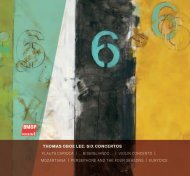Download the album booklet - Boston Modern Orchestra Project
Download the album booklet - Boston Modern Orchestra Project
Download the album booklet - Boston Modern Orchestra Project
Create successful ePaper yourself
Turn your PDF publications into a flip-book with our unique Google optimized e-Paper software.
while she is cradling lincoln’s head in her lap, plea for mercy for all [2 | 9]. and mercy<br />
of a sort is granted, because Keene, like mary magdalene in <strong>the</strong> garden of Gethsemane,<br />
gains access to a transfigured reality. in a scene recalling that in which <strong>the</strong> resurrected<br />
christ addresses mary magdalene in <strong>the</strong> garden, lincoln’s spirit briefly reappears, though<br />
without divine understanding.<br />
during <strong>the</strong> light and almost comical last words of lincoln’s spirit (“i can’t carry a tune two<br />
feet before i spill it.”) <strong>the</strong> orchestra is reduced first to a few rattling, broken chords on a<br />
banjo, <strong>the</strong>n falls totally silent during lincoln’s quotation from his favorite play, macbeth<br />
(“duncan is in his grave. after life’s fitful fever he sleeps well.”) [2 | 13]. <strong>the</strong> silencing of<br />
<strong>the</strong> orchestra at this moment is significant. Besides underlining lincoln’s unmusical personality,<br />
it also negates <strong>the</strong> long-lived illusion that art (especially music) has redeeming<br />
power. music can provide local color (as by quoting “dixie,” “Hail to <strong>the</strong> chief,” and<br />
<strong>the</strong> civil War song “When this cruel War is over” or by faintly echoing negro spirituals,<br />
patriotic marches, seafaring songs or operetta); it can express feelings, differentiate characters<br />
and scenes, enhance <strong>the</strong> drama, relieve and refresh memory, but its redemptive,<br />
healing power is limited. <strong>the</strong> musical silence that surrounds lincoln in this last moment<br />
in <strong>the</strong> opera signals <strong>the</strong> assassinated president’s release from memory and guilt, and<br />
grants him a fleeting rebirth as an imperfect, but guilt-free human being, disrobed of <strong>the</strong><br />
heavy presidential garb of responsibility. obviously, this liberated lincoln has no answer<br />
to Keene’s last question: “oh mister president, don’t you really know what happened?” it<br />
is not lincoln who must make sense of <strong>the</strong> events, but <strong>the</strong> survivors.<br />
paradoxically, sawyer’s gesture of deflating art by silencing it during lincoln’s last words<br />
enhances <strong>the</strong> redeeming potential of <strong>the</strong> last scene. in <strong>the</strong> final chorus <strong>the</strong> audience of<br />
Ford’s <strong>the</strong>ater is heard, chanting <strong>the</strong> long list of names of places where battles were<br />
fought, bodies were mangled, and <strong>the</strong> country was dismembered [2 | 14]. this final<br />
incantation sounds like a desperate effort to make sense of events, to re-member what<br />
was dismembered, to heal what cannot be healed, and to complete <strong>the</strong> truncated line<br />
(“ pluribus, pluribus, pluribus”—from many parts) of <strong>the</strong> motto of <strong>the</strong> united country<br />
(“e pluribus unum”—from many, one). <strong>the</strong> repetition of <strong>the</strong> word pluribus also echoes<br />
<strong>the</strong> French pleurs (tears), giving this final chorus <strong>the</strong> mourning solemnity of Bach’s<br />
passions.<br />
ultimately, <strong>the</strong> opera is not so much about <strong>the</strong> violent act of lincoln’s assassination by<br />
John Wilkes Booth as it is about <strong>the</strong> condition of truncation, division and dismembering,<br />
and <strong>the</strong> possibility of healing, which, as <strong>the</strong> characters reflect, can come only through <strong>the</strong><br />
purgatory of memory and <strong>the</strong> acceptance of guilt. “Funny, how hard it is to remember,<br />
to piece it all toge<strong>the</strong>r, to pick up <strong>the</strong> threads and thrums of what happened,” <strong>the</strong> audience<br />
sings in <strong>the</strong> final chorus. What glimmers through <strong>the</strong> mist of history, <strong>the</strong> mist of<br />
forgetting, mis- and re-membering in this opera is something we are still trying to piece<br />
toge<strong>the</strong>r.<br />
14 15<br />
© 2007 Klára móricz










